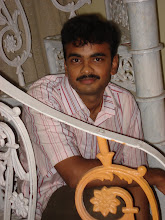Below is the excerpts of a seminar titled "who am I?", that I have attended when I was in IIITH.
Object, Observer and Observability -
English is ambigous enough, so will put forth the definitions which are of interest to us first.
Definitions:
Object - Person or thing to which action or feeling is directed (or)
word or phrase representing person or thing affected by action
Observer - Person who observers/perceives/watches/takes-note scientifically
Observable - Capable of being or liable to be observed.
All scientific experiments 'observe' an 'object'. Observability is possible only when 'object' and 'observer' are different (rather not one) from each other.
Taking this concept, the speaker (did his PhD in Physics, later renounced everything in search of truth), gave us an illustration as part of his talk. He picked each of our senses and then our mind as objects and deduced that we are not mere these senses and mind, as follows -
Q1) Can you observe presence and absence of your vision?
A) We can clearly say when our vision/sight fails and when it works perfectly.
So, we are NOT our eyes.
Q2) Can you observe working of your tougue?
A) We do know when we cant taste things and/or when we can.
So, we are NOT our tongue.
Q3) Can you observe sense of touch, with skin?
A) Yes! we can clearly sense when our skin fails to feel things we touch. Best example is when we sustain burns, area on the skin where burns are present can sense hot/cold or anything. We say skin is dead.
So, we are NOT our skin.
Q4) Can you observe over your sense of smell?
A) We can surely know when our nose is working or not. Example is when we get cold, we cant smell anything.
So, we are NOT our nose.
Q5) Can you observe your hearing?
A) Again yes. We do know when we cant hear a thing and when our ears are working.
So, we are NOT our ears.
We can conclude that we are separate from our 'gyanendriyas'.
Now, lets look at 'karmendriyas'. Can we or can we not know the presence or absence of our legs, kidneys, generative organs, throat and even heart? Yes! we surely can. If you are wondering about heart, a person who has undergone heart transplant does know that he has undergone such.
Hence, we can conclude that we are separate from our 'karmendriyas'. (If you are wondering what gynaendriyas and karmendriyas are, just for a short intro look at http://www.swamij.com/indriyas.htm)
Now, the speaker posed another question - Can you or can you not distinguish when your brain/mind is functioning?
The answer is that we can indeed know when our mind is working or not. Example, when we are in deep sleep our brain/mind is not functioning. But, we know that it is not functioning. That is, we are able to observe the presence and absence of mind too. Which implies, we are separate from our mind.
Final question by the speaker - "If you are not gyanendriyas, karmendriyas, buddi and manas (mind), then what are you? Know yourself."
Who am I?
Wednesday, October 19, 2011
Subscribe to:
Post Comments (Atom)


1 comment:
My friend John's view -
May be the concept of object and observer are taken to a realm where they might not hold.
People usually, to prove their point can make use of stuff which might not be holding true to the present context.
Post a Comment